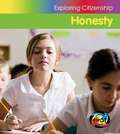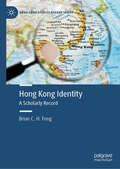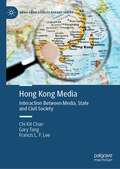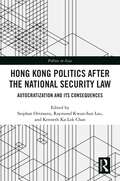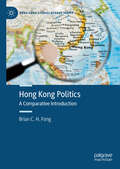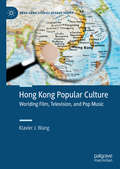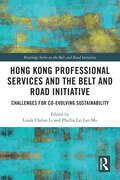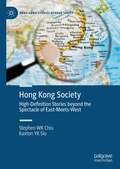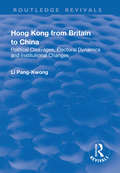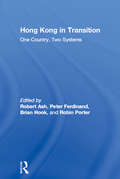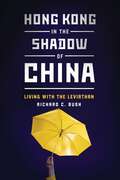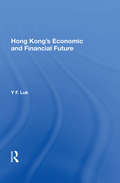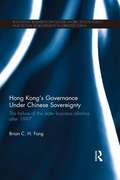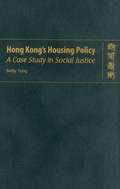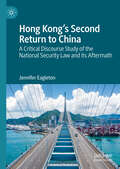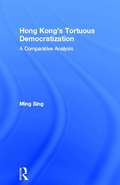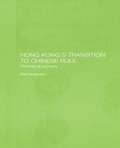- Table View
- List View
Honesty (Exploring Citizenship)
by Sue Barraclough* What is honesty? * Why is trust important? * How does it feel when you cheat? Read Honesty to learn what honest behavior is and why it is important. Find out why telling lies can make things worse, what to do if you find something that is lost, and why it is wrong to copy other people's work. Books in the Exploring Citizenship series look at key citizenship topics. Each book considers an aspect of citizenship, explains why certain behavior is important, and asks readers to think about relevant issues.
Honey and Vinegar: Incentives, Sanctions, and Foreign Policy
by Richard N. Haass Meghan L. O'SullivanButtressed by input from scholars, diplomats, and observers with an intimate knowledge of U. S. foreign policy, Honey and Vinegar examines "engagement" -- strategies that primarily involve the use of positive incentives. The book contends that although engagement has received little scrutiny relative to other, more punitive foreign policy approaches, it has great potential as a tool for modifying the behavior of regimes with which the United States has significant disagreements. Heightened awareness of the costs associated with the use of sanctions or military force has catalyzed a search for policy alternatives. In this quest to find other appropriate policy options for pursuing foreign policy goals, strategies of engagement warrant serious consideration. As argued in these pages, the use of incentives, rather than penalties, may be particularly well suited to the post Cold War world, where globalization has made the economic isolation of any country difficult to achieve. At the same time, the collapse of the,Soviet Union has meant that American carrots may be especially savory to many regimes once reliant on Soviet support. Paradoxically, engagement can be a good choice, even when it fails, in that it can open the door for other policy options. For instance, the two years in which America tried to engage Saddam Hussein before the Gulf War worked to the advantage of the United States later. After Iraq's invasion of Kuwait in 1990, American efforts to build a military coalition to oppose Iraq were facilitated by the sense in the region that the United States had earlier pursued a conciliatory policy, but to no avail. Contributors to this volume have provided seven cases exploring episodes of engagement: relations between the United States and China; Europe's "Critical Dialogue" with Iran; U. S. engagement with Iraq from 1988 to 1990; U. S. efforts to engage North Korea; the combination of U. S. persuasion and coe
Honeymoon With A Killer
by Don Lasseter Ronald E. BowersThe shocking true crime story of a California bride who took her wealthy husband for everything he had—including his life.Everything She Wanted . . .Rebecca Salcedo had an easy smile, a sexy body, and strong appetites—she wanted the world. Bruce Cleland, she decided, would buy it for her. The shy engineer quickly fell victim to her charms, getting her whatever she wanted. A new car. A boat. A house. But he wasn&’t Rebecca&’s only admirer . . .She Got . . .Even after Rebecca manipulated Bruce into marrying her, hoping to divorce him and take him for everything he had, she occupied herself with a series of lovers. Male strippers, women . . . they all spent time in Rebecca&’s bed. But when she learned that a divorce would only get her a few pennies, she knew she had to find another way to secure Bruce&’s fortune.Even Murder . . .Enlisting two family members as killers-for-hire, Rebecca set in motion her solution to the problem. While she watched, the first bullet hit Bruce in the face. Three more would follow. But while Rebecca kept the blood off her hands, she could not conceal evidence that led straight to her, culminating in a trial that would shock a community.With sixteen pages of shocking photosPraise for Honeymoon with a Killer&“The sordid tale of an innocent man and the woman who plotted his murder. . . . Lasseter and Bowers provide readers with a highly detailed depiction of events leading up to and following the gruesome murder of Bruce Cleland. True crime aficionados will savor this riveting read.&” —Publishers Weekly, starred review
Hong Kong (Jake Grafton #8)
by Stephen CoontsIn this action-packed techno-thriller, Jake Grafton is in a roiling and steamy Hong Kong, at the verge of being the fulcrum of change for Communist China, from totalitarian state to democracy.
Hong Kong 20 Years after the Handover
by Brian C.H. Fong Tai-Lok LuiThis book examines the socio-political conflicts which have arisen since Hong Kong's return to China and confronts the fundamental problems in the design of the One Country, Two Systems (OCTS) Model. It considers not only the issue of democratization, but also the institutional fractures in the executive-dominant political system and the disconnection between the executive and the legislature. It describes the drastic changes which have affected social mobilization and political activism in Hong Kong, as well as the pattern of interaction between the government and civil society. This edited volume brings together a team of cutting-edge researchers to examine the operation of the One Country, Two Systems (OCTS) Model in Hong Kong over the past 20 years. The discussion and analysis offered by the contributors will cast light on social and political tensions and conflicts that will continue to unfold in the coming years. This timely account, published on the 20th anniversary of the handover, will be a valuable read for students and scholars of Chinese and East Asian studies.
Hong Kong Constitutionalism: The British Legacy and the Chinese Future (The Rule of Law in China and Comparative Perspectives)
by Richard CullenHong Kong is widely regarded as an exemplar of authoritarian jurisdictions with a positive history of adhering to Rule of Law–shaped governance systems. British Hong Kong provides a remarkable story of the effective development and consolidation of such a system, which has continued to apply since 1997, when it became the Hong Kong Special Administrative Region (HKSAR) within the People’s Republic of China (PRC). This book adopts a fresh approach in examining the evolution of Hong Kong’s political-legal experience. It establishes that these prominent governance achievements were built on particular British constitutional foundations forged over many centuries. The work shows how the analysis of the British theorist Albert Dicey and, in particular, “Diceyan Constitutionalism” was fundamental, within the pivotal context of “Chinese Familism”, in shaping the development of governance institutions and operational procedures within the new British Colony. It discusses how Hong Kong’s system of Authoritarian Legality has come to pass. Exploring the essence of that system, the study probes how thoroughly it has been stress-tested, not least in 2019, and how well it may be placed to cope with tests yet to come. It also analyzes Hong Kong–Beijing relations and the long-term prospects for the HKSAR within the PRC based on a balanced contemporary assessment of China’s exceptional One Party State.
Hong Kong History: Themes in Global Perspective (Hong Kong Studies Reader Series)
by Man-Kong Wong Chi-Man KwongThis book aims at providing an accessible introduction to and summary of the major themes of Hong Kong history that has been studied in the past decades. Each chapter also suggests a number of key historical figures and works that are essential for the understanding of a particular theme. However, the book is by no means merely a general survey of the recent studies of Hong Kong history; it tries to suggest that the best way to approach Hong Kong history is to put it firmly in its international context.
Hong Kong Identity: A Scholarly Record (Hong Kong Studies Reader Series)
by Brian C. FongHong Kong Identity: A Scholarly Record is an empirical analysis of the city’s territorial identity politics. Placing the discussion firmly within comparative politics literature, this book endeavours to present the case study of Hong Kong’s territorial identity politics to both the local and international community. The book empirically traces the historical-political development of the “Hongkongers” identity from 1841 to 2020, with a focus on its evolution into a “collective action frame” since the mid-2010s. Through a number of original data collection—telephone surveys, extended interviews, macro-organisational analysis, organisational surveys, and protest event analysis—this book empirically addresses the research questions of who, why, and how people protested. It guides readers to understand and interpret Hong Kong’s territorial identity politics in a comparative and theoretical way. This book will be of key interest to scholars and students of comparative politics. Experienced political researchers in Hong Kong will find this book illuminating; while comparative political scholars worldwide would also find it a handy introductory text to the critical case of Hong Kong. This book is also an excellent resource for instructors and students of Asian Studies, China Studies, and Hong Kong Studies.
Hong Kong Media: Interaction Between Media, State and Civil Society (Hong Kong Studies Reader Series)
by Francis L. Lee Chi Kit Chan Gary TangThis book explores the challenges to news professionalism and media autonomy stemming from the state, market pressure, the digitalization of communication, and a polarized civil society in Hong Kong. China is tightening its control over post-handover Hong Kong, which includes press freedom. Harsh market competition, coupled with shifting readership from mainstream media to digital platforms, is squeezing the business viability of media organizations. The polarization of civil society in post-handover Hong Kong had degraded consensual values upon which news professionalism relies. Journalists have had to reorient news professionalism and media power in the midst of state-society tension, market pressure, and the shifting communication mode driven by digitalization. These are the key questions for Hong Kong media. This dynamic intervention will be of interest to journalists, scholars of civil society, and scholars of Asian politics.
Hong Kong Politics after the National Security Law: Autocratization and Its Consequences (Politics in Asia)
by Stephan Ortmann Lau, Raymond Kwun-Sun Chan, Kenneth Ka-LokOrtmann, Lau, and Chan together with the contributors provide an innovative assessment of the impact of the National Security Law on Hong Kong politics. The law was introduced by the Chinese government in 2020 and has since fundamentally transformed the political landscape of the former British colony. The book explores how Hong Kong's transformation in governance, law, education, and civil society has amounted to one of the most significant episodes of autocratization in the world in recent years.Each chapter provides theoretical and methodological approaches to capture the different dimensions of the influence of the National Security Law on Hong Kong politics. The trends discussed in the book are of global relevance to the discussion of the current trends of increasing autocratization and this provides insights into the institutional transformations and the adaptive response from Hong Kongers. Also, the extra-territorial application of China’s National Security Law has inevitably global implications, which makes it important to investigate how the Hong Kong overseas diasporas are responding to these challenges.The book is an indispensable resource for scholars and experts on Hong Kong Politics, China's policy toward Hong Kong, international policymakers, journalists, students, and those who are interested in the growing global trend of autocratization.
Hong Kong Politics: A Comparative Introduction (Hong Kong Studies Reader Series)
by Brian C. FongHong Kong Politics: A Comparative Introduction is a comprehensive and pioneering guide of this emerging field. It aims to advance scholarly understanding of Hong Kong’s political developments since the handover of sovereignty in 1997, using a comparative politics approach. The book advances a unique integrated comparative framework for studying Hong Kong through geopolitical, autonomy, centre-periphery, democratisation, political-economic, and governance perspectives. It guides readers to understand and interpret the various political dimensions of Hong Kong in a comprehensive and holistic way. This book will be of key interest to scholars and students of comparative politics. Experienced political researchers in Hong Kong will find this book illuminating; while comparative political scholars worldwide would also find it a handy introductory text to the important case of Hong Kong. This book is also an excellent resource for instructors and students of Asian Studies, China Studies, and Hong Kong Studies.
Hong Kong Popular Culture: Worlding Film, Television, and Pop Music (Hong Kong Studies Reader Series)
by Klavier J. WangThis book traces the evolution of the Hong Kong’s popular culture, namely film, television and popular music (also known as Cantopop), which is knotted with the city’s geo-political, economic and social transformations. Under various historical contingencies and due to the city’s special geo-politics, these three major popular cultural forms have experienced various worlding processes and have generated border-crossing impact culturally and socially. The worlding processes are greatly associated the city’s nature as a reception and departure port to Sinophone migrants and populations of multiethnic and multicultural. Reaching beyond the “golden age” (1980s) of Hong Kong popular culture and afar from a film-centric cultural narration, this book, delineating from the dawn of the 20th century and following a chronological order, untangles how the nowadays popular “Hong Kong film”, “Hong Kong TV” and “Cantopop” are derived from early-age Sinophone cultural heritage, re-shaped through cross-cultural hybridization and influenced by multiple political forces. Review of archives, existing literatures and corporation documents are supplemented with policy analysis and in-depth interviews to explore the centennial development of Hong Kong popular culture, which is by no means demise but at the juncture of critical transition.
Hong Kong Professional Services and the Belt and Road Initiative: Challenges for Co-evolving Sustainability (Routledge Series on the Belt and Road Initiative)
by Linda Chelan Li and Phyllis Lai Lan MoThis book scrutinizes the role of Hong Kong in the expansive, and contested, vision of China’s Belt and Road Initiative (BRI). In two main parts, it first discusses the defining features of the BRI and the evolving expectations of the role of Hong Kong in the BRI from the perspectives of policy makers and the professional sectors of accountancy-finance and the law. The second part contemplates the potential opportunities for Hong Kong from the perspectives of recipient countries-Sri Lanka, Vietnam, Cambodia and Myanmar. Utilizing an action research approach and engaging the views of a broad spectrum of actors, the authors observe the critical role of agency and innovations in a context of institutional contradictions, the impact of BRI governance structure for the deficits in international participation, gaps between grand state visions and commercial interests, and the salience of effective communication in navigating complex policy initiatives. Taking these together unpacks the complex processes shaping Hong Kong’s participation and role in the BRI. This book will appeal to students and researchers interested in the BRI and Hong Kong, in the contexts of institutional contradictions, agency innovations, and political dynamics, as well as sustainable development.
Hong Kong SAR: Meeting the Challenges of Integration with the Mainland
by William Lee Tao Wang Papa N'Diaye Hong Liang Dora Iakova Jorge Chan-Lau Ida LiuThis paper reviews recent trends and developments in the economic integration of the Hong Kong Special Administrative Region (SAR) into the Chinese economy, and key challenges remaining. The analysis is based on data available as of July 2003, and issues discussed include: the fiscal outlook and policy options, developments in the property market and housing prices, deflation dynamics, trends in wage inequality over the last two decades, and financial market developments.
Hong Kong Society: High-Definition Stories beyond the Spectacle of East-Meets-West (Hong Kong Studies Reader Series)
by Stephen WK Chiu Kaxton YK SiuThis book borrows the concept of “high-definition” from digital broadcasting to highlight our unique approach to Hong Kong society, which gives a sharper image than analyses. It intends to highlight contrasts with many common and taken-for-granted stories, myths and representations of Hong Kong— which often presented with a low level of detail, lacking proper connections between grounded personal experiences and the macro social context. With chapters covering various salient dimensions of Hong Kong’s society, including migration, economy, inequality, identity and social movements, our “high-definition” approach presents images with high enough “resolution” to match multiple layers of experiences from walks of life of Hong Kong people, contributing to an understanding of how global transformation impacts local people’s experiences, as well as Hong Kong’s significance in the regional and global system.
Hong Kong from Britain to China: Political Cleavages, Electoral Dynamics and Institutional Changes (Routledge Revivals)
by Li Pang-KwongThis title was first published in 2000: The Sino-British joint declaration in 1985 had called to the end of British rule in Hong Kong, but the impacts of the agreed introduction of popular election during the transitional period have still not fully emerged. Being granted Hong Kong people governing Hong Kong by China after 1997, Hong Kong people are suddenly exposed to the kind of politics that they were not engaged in before. The transitional politics is further complicated by the fact that the majority of Hong Kong voters supported the democrats, whose political value and orientation differed from that of the Beijing government. In order to comprehend the collective behaviour of the Hong Kong voters, the author first traces the development of the Hong Kong state and put his readers into context of Hong Kong electoral politics. By adopting the cleavage approach in explaining the voters’ choice and the election results since the 1990, the author examines whether the existing institutional arrangements as established by the Basic law is capable of solving the political and electoral conflicts of the days.
Hong Kong in Transition: One Country, Two Systems (Routledge Studies in the Modern History of Asia)
by Peter Ferdinand Robin Porter Robert Ash Brian HookHong Kong in Transition offers a perspective on the exceptional constitutional and administrative experiment that has been taking place in Hong Kong, based on a substantial period under Chinese rule. There have been both successes and failures, and a perceptible process of change which is important to document.The particular appeal of this volume lies in the fact that it combines a broad overview with detailed study of individual topics. It is multidisciplinary, and its chapters may be read as 'stand-alone' studies or taken as complementary parts of a whole snapshot of Hong Kong in this critical early period. The chapters are pitched at a level to make them accessible both to undergraduates and to the specialist. Contributors have been drawn from Hong Kong, Macau, the UK, the US, Australia and Germany, reflecting the international interest in the fate of Hong Kong.
Hong Kong in the Shadow of China: Living with the Leviathan
by Richard C. BushA close-up look at the struggle for democracy in Hong Kong.Hong Kong in the Shadow of China is a reflection on the recent political turmoil in Hong Kong during which the Chinese government insisted on gradual movement toward electoral democracy and hundreds of thousands of protesters occupied major thoroughfares to push for full democracy. Fueling this struggle is deep public resentment over growing inequality and how the political system-established by China and dominated by the local business community-reinforces the divide been those who have profited immensely and those who struggle for such basics as housing.Richard Bush, director of the Brookings Institution's Center on East Asia Policy Studies, takes us inside the demonstrations and the demands of the demonstrators and then pulls back to critically explore what Hong Kong and China must do to ensure both economic competitiveness and good governance and the implications of Hong Kong developments for United States policy.
Hong Kong's Economic And Financial Future
by Y. F. LukSIGNIFICANT ISSUES SERIES papers are written for and published by the Center for Strategic and International Studies. The series will present the insights of prominent East Asian analysts and draw conclusions about complementarities or divergences that may exist. Those insights, in tum, will serve in the aggregate as the basis for a richer, cross-
Hong Kong's Governance Under Chinese Sovereignty: The Failure of the State-Business Alliance after 1997 (Routledge Research on Social Work, Social Policy and Social Development in Greater China)
by Brian C. FongAs a hybrid regime, Hong Kong has been governed by a state-business alliance since the colonial era. However, since the handover in 1997, the transformation of Hong Kong’s political and socio-economic environment has eroded the conditions that supported a viable state-business alliance. This state-business alliance, which was once a solution for Hong Kong’s governance, has now become a political burden, rather than a political asset, to the post-colonial Hong Kong state. This book presents a critical re-examination of the post-1997 governance crisis in Hong Kong under the Tung Chee-hwa and Donald Tsang administrations. It shows that the state-business alliance has failed to function as an organizational machinery for supporting the post-colonial state, and has also served to generate new governance problems. Drawing upon contemporary theories on hybrid regimes and state capacity, this book looks beyond the existing opposition-centered explanations of Hong Kong’s governance crisis. By establishing the causal relationship between the failure of the state-business alliance and the governance crisis facing the post-colonial state, Brian C. H. Fong broadens our understanding of the governance problems and political confrontations in post-colonial Hong Kong. In turn, he posits that although the state-business alliance worked effectively for the colonial state in the past, it is now a major problem for the post-colonial state, and suggests that Hong Kong needs a realignment of a new governing coalition. Hong Kong’s Governance under Chinese Sovereignty will enrich and broaden the existing literature on Hong Kong’s public governance whilst casting new light on the territory’s political developments. As such, it will be welcomed by students and scholars interested in Chinese politics, Hong Kong politics, and governance.
Hong Kong's Housing Policy - A Case Study in Social Justice
by Betty YungThis book examines housing policy in Hong Kong using a new and unique interdisciplinary approach - combining the philosophical discussion on social justice with policy and housing studies. It considers both Western and Chinese concepts of social justice,a
Hong Kong's Second Return to China: A Critical Discourse Study of the National Security Law and its Aftermath
by Jennifer EagletonThis book is a cross-disciplinary study, incorporating political science, law, and sociolinguistics in its examination of Hong Kong&’s National Security Law which has impacted many aspects of life in the city. Through a critical discourse analysis lens, it details the lead-up to the Law&’s introduction in 2020, a textual analysis of the Law itself, the &“selling&” the Law to the public, the accompanying electoral changes, the effect on civil society, and the discourse of dissidents in exile. It ends with speculation on what the future will bring to the so-called &“One Country, Two Systems&” as it goes forward. The book caters for the general reader, the university student, and seasoned academic who want to be informed about the changes in Hong Kong as it transitions to be more &“fully China&”. The book ultimately argues that the &“One Country, Two Systems&” experimental framework had always been problematic from both a rhetorical and ideological perspective.
Hong Kong's Tortuous Democratization: A Comparative Analysis (Routledge Contemporary China Series #Vol. 2)
by Ming SingThis book raises interesting questions about the process of democratization in Hong Kong. It asks why democracy has been so long delayed when Hong Kong's level of socio-economic development has become so high. It relates democratization in Hong Kong to wider studies of the democratization process elsewhere, and it supplements the received wisdom - that democracy was delayed because of colonial rule and by the opposition of China - with new thinking, for example, that its quasi-bureaucratic authoritarian political structure vested power in bureaucrats who refused to have top-down democratization; a politically weak civil society and a non-participant political culture that crippled bottom-up democratization; plus the division between pro-democratic civil society and political society.
Hong Kong's Transition to Chinese Rule: The Limits of Autonomy
by Ralf HorlemannFollowing the return of Hong Kong to Chinese sovereignty, it appears that the 'high degree of autonomy' promised to Hong Kong is limited in many ways. China's reservations about the development of democracy in Hong Kong lies at the heart of the problem. The conceptual inadequacies set out in the Basic Law, Hong Kong's mini-constitution, show a correlation between a lack of democracy and a loss of autonomy. This book argues that genuine autonomy from the central government in Beijing is impossible without a democratic system in Hong Kong. Developments since the handover have, however, demonstrated that democratic trends have been halted and even reversed and that democracy is not likely to be established in Hong Kong in the near future.
Hong Kong, China Growth, Structural Change, and Economic Stability During the Transition
by John Dodsworth Dubravko Mihaljek#Includes bibliographical references (p. ).
